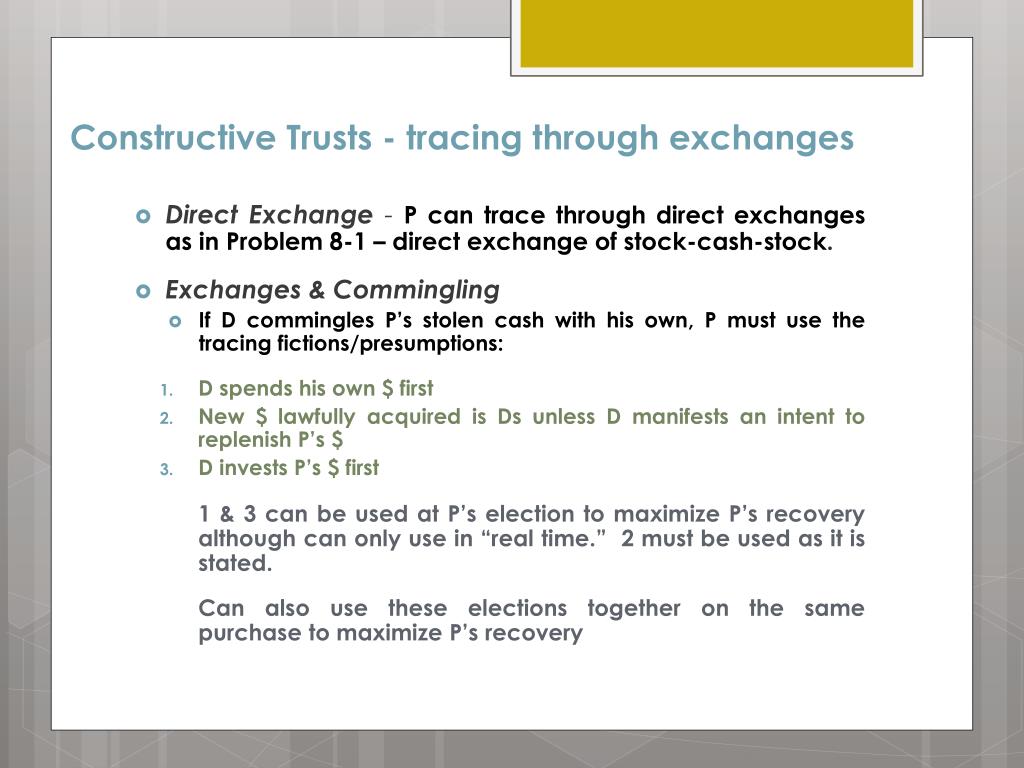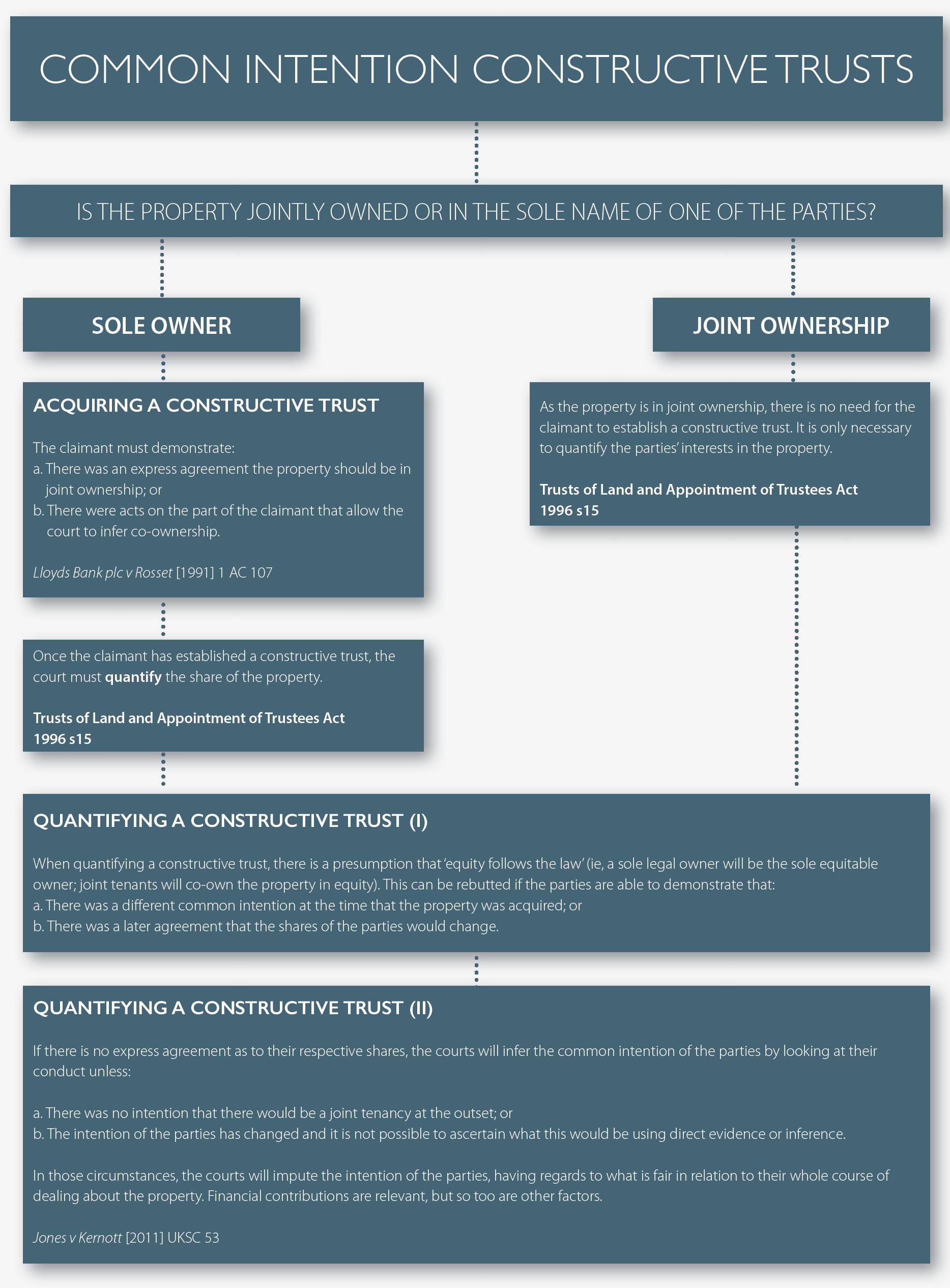Discovering Exactly How Does a Constructive Depend On Job in Property and Asset Disputes
The concept of a useful count on acts as an important device within building and asset conflicts, dealing with situations where one party has actually unfairly profited at the expenditure of one more. This fair solution not only seeks to remedy injustices yet likewise emphasizes the value of objective and payment in figuring out rightful possession. By checking out the subtleties of how constructive trust funds run, one can discover the complexities that usually occur in lawful contexts. What ramifications do these trusts hold for future conflicts, and how might they influence the landscape of residential property regulation?

Definition of Constructive Count On
A useful trust fund occurs when a court identifies that it is needed to stop unjust enrichment, often in scenarios where a party has acquired residential property with wrongful methods or under circumstances that require equitable alleviation. This legal solution is not formally established by the events involved; instead, it is imposed by the court to resolve scenarios where fairness and justice demand intervention.
Constructive counts on are often conjured up in instances including scams, violation of fiduciary duty, or other forms of misbehavior. If an individual wrongfully takes ownership of building that truly belongs to an additional, the court might impose a positive depend on to ensure that the criminal holds the home for the advantage of the rightful owner. This lawful idea runs on the concept that it would certainly be inequitable for the wrongdoer to maintain the advantages derived from their misconduct.
Ultimately, a constructive count on offers as a powerful device in building disputes, strengthening the idea that ownership ought to mirror not just lawful title yet additionally moral considerations. By identifying the need for fair relief, courts ensure that justice dominates in the circulation of home and properties.
Trick Principles of Positive Depends On
While the application of positive counts on may vary relying on specific conditions, numerous crucial principles consistently underpin their enforcement in building conflicts. The principle of unjustified enrichment plays a critical duty; a useful trust fund is often imposed to stop one party from unfairly profiting at the expense of another. This principle emphasizes the equitable nature of positive depends on, highlighting that lawful ownership does not constantly correspond to rightful ownership.
Secondly, the demand of a fiduciary partnership is significant. What Is A Constructive Trust. Constructive counts on regularly develop in contexts where one event has a duty to act in the most effective rate of interests of an additional, such as in collaborations or joint ventures. Breaches of this duty can set off the charge of a useful depend on to shield the hurt party's rate of interests
In addition, the doctrine of intent is essential, as courts consider whether the events intended to produce a trust-like partnership, also if not officially documented. The principle of fair treatments highlights that constructive trust funds serve to give relief that aligns with justness and justice, guaranteeing that the rightful complaintant can gain back residential or commercial property or properties that they are entitled to, regardless of legal title staying elsewhere.
Applications in Property Conflicts
Constructive depends on find substantial application in home disagreements, especially when resolving problems of ownership and fair rights. These counts on emerge in situations where one event holds home under problems that, in justness and justice, should benefit an additional event. The equitable treatment of a positive trust avoids unjustified enrichment by recognizing the contributions of a celebration that, despite doing not have official title, has a legit claim to the building.
One common situation entails cohabiting companions that add to the procurement or maintenance of building yet are out the title deed. In such cases, the courts may enforce a constructive depend mirror the events' payments and intents, consequently ensuring that the non-titled companion obtains a reasonable share of the property.
In addition, positive trust funds can be essential in disputes entailing inheritance or household residential property, where a decedent's intent might not have been formally recorded. Courts may infer a positive trust fund to recognize the decedent's desires and correct potential injustices among heirs. On the whole, positive counts on work as a vital device in balancing legal rights and guaranteeing equitable end results in building disagreements, enhancing the concept that justness should dominate in possession matters.
Situation Studies and Instances
Building conflicts involving positive depends on can typically be illustrated through real-life study that highlight the complexities and subtleties of equitable rights. One notable instance is * Gissing v. Gissing *, where a spouse declared a useful passion in the family home, suggesting that her economic contributions throughout the marital relationship warranted a positive trust. The court eventually regulationed in her support, establishing that her contributions developed an equitable rate of interest regardless of the building being entirely in her husband's name.
One more illustratory recommended you read situation is * Thompson v. Thompson *, where brother or sisters disputed the ownership of a household estate after their moms and dads' passing. One sibling had preserved and enhanced the residential or commercial property, asserting that these actions validated a useful depend on. The court identified the sibling's initiatives and located that a useful trust fund was required to avoid unfair enrichment, thus awarding them a share in the estate.
These instances exemplify how useful trusts serve to deal with circumstances where lawful possession does not reflect truth equitable interests of the celebrations included, highlighting the significance of intent and contributions in identifying rightful cases in residential property disputes.
Lawful Implications and Factors To Consider
Various lawful implications and factors to consider arise when resolving constructive count on building disputes. Foremost, the establishment of a useful trust fund typically pivots on the existence of an unfair enrichment, in which one event benefits at the cost of an additional. This concept demands a complete exam of the relationship between the parties and the situations that caused the claimed injustice.
In addition, courts often require clear evidence of the claimant's contribution to the building or asset in concern, which can include monetary investments, labor, or various other kinds of support. The concern of evidence resides the plaintiff, demanding thorough documents and testament to confirm their cases.
In top article addition, the timing of cases is critical, as laws of restrictions might limit the capability to develop a constructive count on after a certain period. Lawful advise should navigate these time restraints carefully to ensure that cases are filed in a timely fashion.
Finally, the potential for disagreements over the intent behind property transfers can make complex matters further, demanding a nuanced understanding of both statutory regulation and instance legislation to efficiently support for a customer's interests in positive depend on claims.
Conclusion

The idea of a useful count on offers as a next page crucial system within residential or commercial property and asset conflicts, dealing with circumstances where one event has unjustly profited at the expenditure of another. If an individual wrongfully takes property of home that truly belongs to one more, the court might enforce a positive trust fund to ensure that the perpetrator holds the residential property for the advantage of the rightful proprietor.Constructive counts on find considerable application in home disagreements, specifically when addressing issues of ownership and equitable civil liberties. On the whole, positive trusts serve as a vital device in harmonizing legal rights and making sure equitable end results in property disagreements, strengthening the principle that fairness must dominate in ownership issues.
In recap, useful counts on offer as essential fair remedies in home and possession disputes, addressing unjustified enrichment by acknowledging the contributions of events involved. - What Is A Constructive Trust